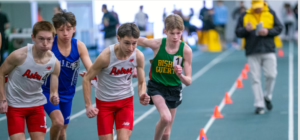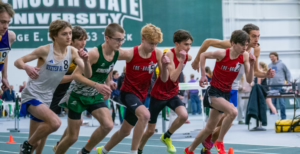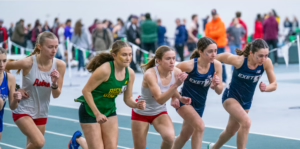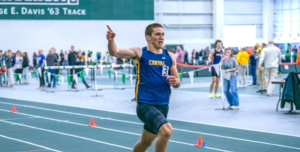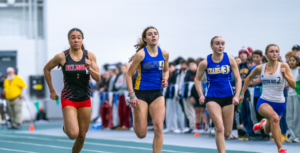Hanover XC 1983
Interviewed by retired Hanover XC Coach (1981-2012) Jim Eakin
Rolf was the first big time runner that Hanover cross country later became known for. Rolf was not only dominant his senior year at the conference level (CVC Champion), but went on to win both the Class I and Meet of Champions title, as well as placing 3rd at the New England Championships. His time of 16:09 at Derryfield Park still ranks 2nd (tied with Russell Brown) on the All-time Derryfield times for Hanover runners. He, along with his training partner and friend, Nord Samuelson, played a vital role in Hanover High School winning its first Class I State Championship in 1982. When it came to dedication, consistency, training, toughness, humility, humor, and strength, Rolf set the standard for future Hanover harriers.
His track accomplishments were also impressive, culminating in a New England 1600 meter title. His personal track bests were: 9:16.2 (3200), 4:13.64 (mile), 1:56.8 (800), and 52.2 (400). Rolf went on to Princeton University, but unfortunately his college career was cut short by a knee injury. Because of his record, The Sonnerup Trophy was named after him and presented to the top male Hanover runner at the annual end-of-season cross country banquet.
In 1993, Rolf faced his biggest challenge when he was involved in a climbing accident suffering a severed leg.
I came to teach and coach cross country and track at Hanover in the fall of 1981. When I accepted the position as a Learning Specialist at the high school, I thought I was done with coaching; however, I was asked by the athletic director if I would consider coaching again because he had just fired the coach. I was not sure what I was getting into. You were a junior then, what was your reaction to having a new coach?
I had taken the Class-I 3200 meter title in  the spring, and Bill McGrath and Nord Samuelson organized training in August, so I wasn’t too worried. Probably my ego was already out of control. We were ready for you because the Hanover XC culture was changing from party sport to something more serious. By “we” I mean Nord and Billy, and Derek Eaton the year before – they were the real leaders. My contribution, I suppose, was helping bury the team’s partier reputation. Partiers have friends, charisma, girlfriends, and the like. Hard to associate me with any of those.
the spring, and Bill McGrath and Nord Samuelson organized training in August, so I wasn’t too worried. Probably my ego was already out of control. We were ready for you because the Hanover XC culture was changing from party sport to something more serious. By “we” I mean Nord and Billy, and Derek Eaton the year before – they were the real leaders. My contribution, I suppose, was helping bury the team’s partier reputation. Partiers have friends, charisma, girlfriends, and the like. Hard to associate me with any of those.
I remember vividly the bus ride home from the 1981 state (I) meet. We had placed, I think, three guys in the top ten, and yet failed to win the team title. You chewed us out for at least 10 minutes. That was new.
I like the grittier aspects of training and racing and I appreciated your willingness to bust my chops. A lot of coaches would’ve handled me like a prima donna but I wasn’t getting any free passes. You (and Tom Jennings: head track coach/ass’t cross country coach) kept reminding me that I wasn’t faster than the other guys, I was less slow. Plus, I always had that one guy at practice that could kick my butt. I knew it.
What are you presently doing as a career? Did competing as a runner aid you in pursing your career?
I’m an oceanographer/climate scientist. I learned how to take myself and my activities seriously in track/XC, and I never would’ve gotten into any of the colleges I applied to without my running. Not a chance.
I never spoke to you about your climbing accident. If you wish, would you like to briefly describe what happened and the impact it has had on you?
That was devastating. I’m glad we’re not doing this in person. We were on an overhanging face when a good-sized rock broke loose above me. I just couldn’t get out of the way. The leg was one thing, I was helpless there with a collapsed lung and crushed shoulder, and somehow my left arm and other leg were trashed as well. Thankfully, my right hand was working. With coaching, I was able to lower my clear-thinking friend and he quickly arranged a rescue. That was a lonely time up there, waiting and wondering. I spent about six weeks mostly unconscious in an ICU, surgeries all over, and another 6 months in and out of rehab. What followed were some dark days. I’m amazed and grateful that my wife, friends, and family stuck with me. I lost touch with almost everybody during that time. It was just too much.
After about a decade feeling sorry for myself (and kayaking), I discovered that I can cross country ski with very little handicap. Some buddies urged me to enter a race with them… “C’mon Rolf, we’ll help you!”
“Help me? You guys are totaled,” was my thinking. I crushed ‘em (by a little), but I made a great discovery: Training and prepping for a race, giving it your all, and finishing in the middle of the pack yields exactly the same feeling you get when doing the same, but winning by a ton. I do as much XC skiing as I can, and “race” from time to time. I cycle a fair amount, and can hike a bit. I have loved being outside as long as I can remember so getting that back was a treasure.
Describe racing at Derryfield Park.
I don’t remember anything unique about it, although my both my highs/lows were at that venue. Our ragtag little band, we were usually amazed to have made it that far.
Describe both your most memorable and least memorable moments running cross country in high school.
 Junior year, all year, was a highlight for me. Nobody expected much, so it was easy to be happy. And hey, we finally won states in 1982.
Junior year, all year, was a highlight for me. Nobody expected much, so it was easy to be happy. And hey, we finally won states in 1982.
A great memory for me was the Class I meet my junior year – 1981. Jim’s first year coaching. It was the only race I won that season. The last week of summer vacation I had badly sprained my ankle playing ultimate frisbee. Jim had me train by cycling: We would tape my ankle and I would go out alone and hammer. I really liked that. Towards the end of the season, like at CVCs, I ran, taped, as Hanover’s #5 – the most important guy on the team, after all. I did what I could. At state I knew we had a chance of doing well, and this being the last race of the year and all, I decided to skip the tape: Nothing to lose. I figured I’d score okay if I watched my footing and could keep Billy (McGrath) in sight for at least a little while. Managed to keep in touch and I remember coming out of the woods, maybe about a mile to go, and you (Jim) waiting there with the first racing advice I ever got from you: “Ah Rolf, just TAKE this thing!” I suppose you were joking – I had no business running with those guys – but I had this 16 yr old boy’s brain and I loved going to the basement, as they say. Managed to eke it out and FINALLY put a full year of razzing to rest: In my least memorable moment, I had banged up my shin the night before the 1980 state meet (again, playing frisbee) and let the team down badly. Some of the guys were still pretty sore about that. I managed to hang on to the disc both times, by the way.
You were close to more than several teammates from the cross country team. Can you describe some of those friendships and how they helped you succeed?
Nord Samuelson (later became brother-in- law to Olympic Champion Joan Benoit Samuleson) convinced me to come out for track in the spring of freshman year. Growing up, Nord and I had run in different circles – good/bad grades never/usually in trouble, respectively. My sisters had been great runners at HHS, so I suppose he was working me as part of his not-so-secret plan to turn Hanover into an XC/track powerhouse. I goofed around at practice, and at meets Nord and I would try to qualify for the Class-I 3200m. In the end we both made it, barely, and our results showed just how barely. He and I took 1st and 2nd in that event our senior year. That was my proudest moment at Hanover High. We had come a long way.
Sophomore year I went out for XC. I would try to run out near the front with (Senior) Derek Eaton and (Junior) Bill McGrath. Sometimes I’d keep up, sometimes I’d blow up. I didn’t take the workouts all that seriously, I just liked tearing around in the hills around Hanover after school, BS-ing with the guys. Plus, all the cross country girls were super smart and so pretty. Everybody knows that.
This was the first time in my life I’d been noticeably good at anything. Even though it’s such a simple little thing – when the gun goes off, run hard until somebody tells you, you can stop – running success affected me academically and socially. Most of the guys were good students, and all of a sudden I had these coaches, parents, and even teachers taking me seriously, expecting me to do well. I was just an insecure kid, jumping the bars people put in front of me.
I owe a lot of my personal resources to having great training partners and academic examples in high school. In those days it seemed like everything Nord Samuelson touched turned to gold. It worked on me.
What was your favorite high school workout?
Intervals, man. Bring ‘em.
At HHS my favorite was a two-person 20×400. You run a 400, hand off, and rest while your partner runs his. Repeat until you’ve each run 10. The thing is, the faster you run, the less rest your partner gets, slowing him down, so you get more rest. Those built in incentives make you run every interval hard.
Why were you so successful as a distance runner?
Well, I wasn’t really. I think I ended up ranked something like 6th and 16th nationally in the indoor/outdoor mile that year, and was really not mentally disciplined enough to run 5000m competently, at least in high school. I will say that after the first year or two, when I only tried hard at meets, I went after it at our workouts. My mom is tougher’n tough, and my dad is an eternal optimist so I’ll credit my parents on that one.
Did you do anything different than the rest of your competitors? I do remember we would lift free weights 2 or 3x a week in the Duke’s Weight Room. Did that help?
In those days people talked a lot about hundred-mile weeks. We didn’t do any of that. Maybe 30-40 for me? We focused on quality, intervals, and weight training. When I started I could run all day and not run out of air, but I couldn’t run a 220 under 30 seconds. Informally, Andy Gamble (later, Lebanon HS track coach), Van Preston, Nord, Eric Stewart, Scott Eaton and I got busy with weights. Andy and Van, football players with actual muscles, were a couple of good natured guys willing to tolerate and advise a few scrawny runners. So yes, the weights helped. That said, we turned a distance runner into a miler with that regimen. I kind of faked it through cross country.
When you first started to compete in high school, you could not break 30 seconds in the 200. Besides maturing, what helped you get faster, because you were known for a great finish? In fact, if I recall, you waited too long at the New Englands to start your “kick”!!
I have two theories on my finishing speed: Intervals, and, umm, maybe I was a sandbagger. You could say I did the bare minimum every week. I never, ever, paid attention to my pace over the first couple of miles, following a two step strategy: Keep the leaders in sight, then serve lights out. I would encourage myself “okay, half mile to go, that’ll take two minutes (not kidding), and I can take anything for two minutes.” The problem with this strategy is you never end up going any faster than the next guy, minus a couple of seconds.
In track senior year, I skipped New Englands and raced outside of the region. I had zero kick in those races where I had to run honestly end-to-end. So I guess there’s your answer. Ahem. Intervals: that’s my story and I’m sticking to it.
Speaking of the competition/competitors. Do you remember if you did anything to prepare for those championship races?
Did you employ any strategy to best the likes of Dan Godin/Londonderry, Pat Piper/Hopkinton, Monty Davis/FM, Scott Clark/Gilford and of course Billy or did you not worry much about the competition?
Strategy? I just got nervous. Sophomore year there was Dave Westover (Stevens) and Rob Edson (Keene), but they were so much stronger it was ridiculous. I floated through XC junior year, happy to be running again. I might’ve done okay at New Englands – You and Billy were very happy afterwards, I remember that. Facing a few weeks off from me, probably that was why. By the end of track that year I was on my own, so I didn’t think much about it. In those pre-internet days it was easy to be oblivious.
New Englands. Simple strategy, yet I forgot step one. I think I was in like 35th with half a mile to go. Pat Piper, who prevailed, would count as a rival. I had treated Pat like my personal pacer the year before (in track), dusting him in the final 200m week after week, and in XC the week before as well. Not nice. After New Englands, he said something like “Nice of you to share.” With a smile, though. That was a fun rivalry. Pat would drive halfway across to state to cheer for / tease me at meets he wasn’t even competing in. He really loved running. And maybe one or two of the Hanover girls, I’m not sure.
Do you have any advice to share with present high school xc runners? You mentioned your son was beginning to run cross country, how much are you involved with his running?
Enjoy it. There’s nothing more fun than taking a couple of hours a day to clear out your pipes and enjoy your friends in a beautiful place.
My Son? He’s a freshman and I think he had a good time. He had grown about a foot and a half the prior two years, so we were happy he ran all season without injury. He’s probably good and tired of hearing about how great he’s supposed to be because of who his dad was. I’m trying to stay out of it. I sneak off to his meets, though. One day, with about 800m to go, I see he’s loping along with a pack of about 30 guys in front of him, and they’re all just dying. He looks fine. I start shouting stuff like “Holy ___ there’s 30 easy points for the taking if you put the hammer down NOW!” I’m jumping up and down, having a heart attack, and he comes trotting by and waves…”Hi Daddy”. Why coach that out of him? I’d take either of my friendly boys over me, any day.
Thanks Rolf!!!








